
The X-Rays is an 1897 British silent comic trick film directed by George Albert Smith, featuring a courting couple exposed to X-rays. The 44-second trick film, according to Michael Brooke of BFI Screenonline, "contains one of the first British examples of special effects created by means of jump cuts" Smith employs the jump-cut twice; first to transform his courting couple via "X rays," dramatized by means of the actors donning black bodysuits decorated with skeletons and with the woman holding only the metal support work of her umbrella, and then to return them and the umbrella to normal. The couple in question were played by Smith's wife Laura Bayley and Tom Green, a Brighton comedian.

The Little Match Seller is a 1902 British short silent drama film, directed by James Williamson, retelling the classic 1845 Hans Christian Andersen fable of the sad life and tragic death of a little match seller. This major fiction film of the period was, according to Michael Brooke of BFI Screenonline, "a serious attempt at depicting a person's inner emotional life on film through purely visual means, using trick effects not to provoke laughter but for serious dramatic reasons." It is one of the oldest surviving silent films.
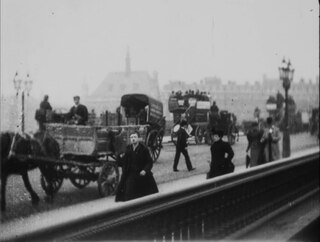
Blackfriars Bridge is an 1896 British short black-and-white silent actuality film, directed by Robert W. Paul, featuring top-hatted pedestrians and horse-drawn carriages passing over Blackfriars Bridge, London. The film was, according to Michael Brooke of BFI Screenonline, "taken from the southern end looking northwards over the Thames by R.W. Paul in July 1896," and, "screened as part of his Alhambra Theatre programme shortly afterwards, certainly no later than 31 August"

A Railway Collision is a 1900 British short silent drama film, directed by Walter R. Booth and produced by Robert W. Paul. It was one of a number of sensationalist "trick films" made at Paul's Animatograph Works, his studio in Muswell Hill in north London, and represents one of only a very small number of surviving films by Paul.

Walter Robert Booth was a British magician and early pioneer of British film. Collaborating with Robert W. Paul and then Charles Urban mostly on "trick" films, he pioneered techniques that led to what has been described as the first British animated film, The Hand of the Artist (1906). Booth is also notable for making the earliest film adaptation of A Christmas Carol with the silent film Scrooge, or, Marley's Ghost (1901).

Upside Down; or, the Human Flies is an 1899 British silent trick film, directed by Walter R. Booth, featuring a conjuror sending his audience to the ceiling. The film, "exploits a very simple illusion: that of filming with the camera turned upside-down so that the actors appear to be performing on the ceiling," and according to Michael Brooke of BFI Screenonline, "the effectiveness of the final result is such that nearly seventy years later Stanley Kubrick used the same technique in 2001: A Space Odyssey (1968)." The conjuror was reputedly played by Booth himself.

Undressing Extraordinary is a 1901 British silent comic trick film directed by Walter R. Booth, featuring a tired traveller struggling to undress for bed. The film, "provides one of the earliest filmed examples of something that would become a staple of both visual comedy and Surrealist art: that of inanimate objects refusing to obey natural physical laws, usually to the detriment of the person encountering them," and according to Michael Brooke of BFI Screenonline, "has also been cited as a pioneering horror film," as, "the inability to complete an apparently simple task for reasons beyond one's control is one of the basic ingredients of a nightmare."

The Waif and the Wizard, also entitled The Home Made Happy, is a 1901 British silent comic trick film, directed by Walter R. Booth, featuring a magician using his magic to aid an ailing girl at the request of her brother. The film, "is rather less elaborate in terms of special effects than the other films that W.R. Booth and R.W. Paul made the same year," but according to Michael Brooke of BFI Screenonline, "provides an excellent illustration of how effects used sparingly can often have more impact, especially when set in a suitable emotional context."
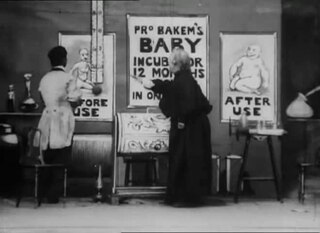
An Over-Incubated Baby is a 1901 British silent comic trick film, directed by Walter R. Booth, featuring a woman who gets an unpleasant surprise after placing her baby in Professor Bakem's baby incubator for 12 months growth in one hour. The film is, "one of the most original of the trick films made by W.R. Booth and R.W. Paul in 1901." According to Michael Brooke of BFI Screenonline, "one of the less elaborate films made by Booth and Paul that year, though the concept itself is so imaginative that it arguably didn't need any more than basic jump-cut transformations."

Cheese Mites, or Lilliputians in a London Restaurant is a 1901 British short silent trick film, directed by Walter R. Booth. A gentleman is entertained by the little people who emerge from the cheese at his table.

Artistic Creation is a 1901 British silent comic trick film directed by Walter R. Booth, featuring a lightning sketch artist drawing a picture of a woman which comes to life piece by piece. The film "is one of the earliest examples of a film about an artist's creations coming to life," and according to Michael Brooke of BFI Screenonline, "a metaphorical cautionary tale about the responsibilities that should be borne by both creative artists and indeed the male sex in general."

The Haunted Curiosity Shop is a 1901 British silent horror trick film directed by Walter R. Booth, featuring an elderly curio dealer alarmed by various apparitions that appear in his shop.
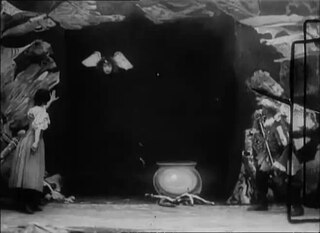
The Magic Sword; or, A Medieval Mystery is a 1901 British silent fantasy trick film, directed by Walter R. Booth, featuring a mediaeval knight battling to save a damsel from an ogre and a witch. The film, "is impressively elaborate, with single shots containing multiple trick effects achieved through complex double exposures and superimpositions," and according to Michael Brooke of BFI Screenonline, "was so startling that it moved the legendary stage illusionist J.N. Maskelyne to describe The Magic Sword as the finest trick film made up to then."

The Extraordinary Waiter is a 1902 British silent comic trick film, directed by Walter R. Booth, featuring a brutish colonialist failing to destroy a blackfaced waiter. The film "makes for somewhat uncomfortable viewing," but according to Michael Brooke of BFI Screenonline, "it's just about possible to read this as a metaphor for the rather more widespread frustrations arising from British colonial rule, though it seems unlikely that this was intentional on Booth's part."
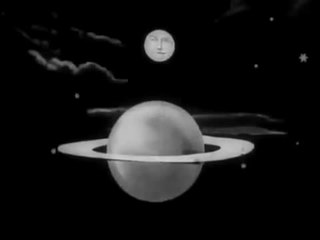
The '?' Motorist is a 1906 British silent comedy trick film, commonly called "The Mad Motorist" or "Questionmark Motorist" and directed by Walter R. Booth. Released in October 1906, the film is "one of the last films that W.R. Booth made for the producer-inventor R.W. Paul," and, according to Michael Brooke of BFI Screenonline, "looks forward to the more elaborate fantasies that Booth would make for Charles Urban between 1907 and 1911, as well as drawing on a wide range of the visual tricks that Booth had developed over the preceding half-decade."

Is Spiritualism a Fraud? is a 1906 British silent trick film directed by Walter R. Booth, featuring a medium exposed as a fake during a séance.
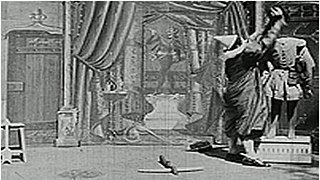
Adventures of William Tell is an 1898 French silent trick film directed by Georges Méliès, featuring a clown trying to shoot fruit off the head of a dummy which comes to life. The film is "a knockabout farce based on jump-cuts and the timely substitution of dummies for real bodies," with, according to Michael Brooke of BFI Screenonline, "a level of onscreen violence not previously seen in a surviving Méliès film," which marks, "a bridge between the onstage effects of the famous Théâtre du Grand Guignol and countless later outpourings of comically extreme screen violence as seen in everything from Tex Avery cartoons to the early films of Sam Raimi."

The Automatic Motorist is a 1911 British silent comic trick film, directed by Walter R. Booth, featuring a robot chauffeur taking an inventor and a young honeymooning couple on a wild ride around the planets and under the sea. The trick film is a "virtual remake of The '?' Motorist (1906)," according to Michael Brooke of BFI Screenonline, "but on a bigger scale."

Willie's Magic Wand is a 1907 British silent comic trick film, directed by Walter R. Booth, featuring a young boy terrorising the household with his father's magic wand.

Army Life; or, How Soldiers Are Made: Mounted Infantry is a 1900 British short black-and-white silent propaganda actuality film, directed by Robert W. Paul, featuring the King's Own Royal Lancaster Regiment riding over a plain. The film, which premiered on 18 September 1900 at the Alhambra Theatre in London, England, "is all that appears to remain of one of R.W. Paul's most ambitious projects," which, according to Micahael Brooke of BFI Screenonline, "had it survived in a more complete form," "would undoubtedly be considered one of the most important precursors of the modern documentary."




















